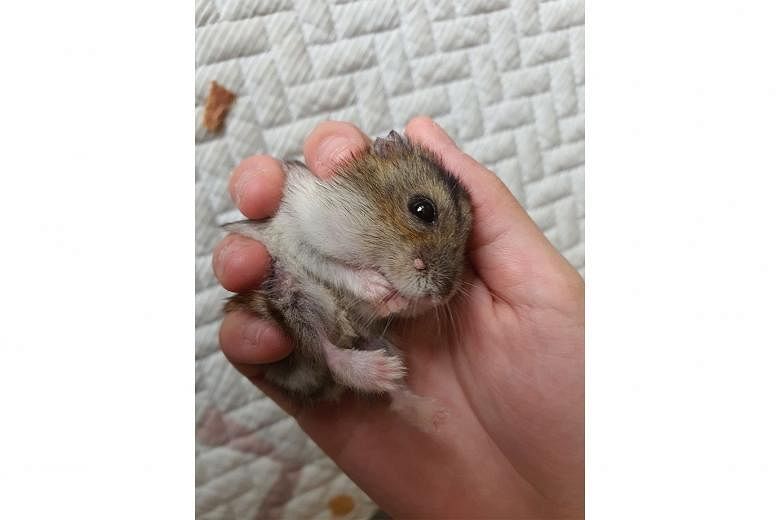Lump growing on hamster's face
I notice a pink lump on my two-year-old hamster's face recently. It grew from a small dot. What is the lump and does he need medication for it?
Heu Song Ying
Due to the location of the lump, special attention has to be paid to whether your hamster's breathing and eating have been affected.
An examination by a vet is required to ascertain the cause of the lump, especially if it has grown quite quickly. Knowing if there is any hair loss or itch in other parts of the body will help in the diagnosis.
A vet may need to conduct diagnostic tests of the affected skin areas, such as a skin scrape, hair examination and biopsy.
Some potential causes include a mite infection (demodicosis), a cancerous growth or an infected abscess.
Depending on the cause, the range of treatments may include application of parasite treatment, antibiotics or surgical removal.
Poodle with a biting habit
My five-year-old poodle Yoyo has been biting her paws since she was a puppy. How do I solve the problem?
Teresa Fong
This is a relatively common problem among dogs and there could be a few reasons.
First, I suggest Yoyo visit her vet for an examination. A close check of the paws is needed to ensure there are no foreign bodies such as grass seeds and sharp objects that could have injured or are irritating the paw.
Does Yoyo also lick or bite other parts of her body? Are there signs of itch that accompanies her biting behaviour?
The parts Yoyo is biting, licking or scratching will help your vet assess if this is a localised problem or a more generalised condition.
A common cause for a dog biting/licking its paw is a parasite infection (for example, mites), which could be resolved with regular anti-parasitic treatments.
Another common cause is an allergy.
For a food allergy, expect to see a more generalised itch on various parts of the body.
Contact allergy - for example, due to exposure to certain chemicals or pollens - tends to be more localised at the areas where the skin is in contact with the allergen.
For instance, a dog's feet may flare up after walking through a grass patch where there is pollen it is allergic to.
Sometimes, constant licking or biting of paws could be attributed to behavioural causes as well, such as separation anxiety.
Understanding the cause of the anxiety can help identify a suitable solution.
This takes close observation of the pet by the owner. Often, enrichment and positive reinforcement training is needed to address such behavioural causes.
Frequent licking/biting of the paws can also cause secondary bacteria or yeast infection due to the area being moist. Your vet will be able to advise the treatment needed if there are signs of such infection.
-
WEBINAR ON CANINE BEHAVIOUR
The Animal & Veterinary Service (AVS) is conducting a webinar on canine behaviour on Oct 27 and 28 at 4.30pm. Internationally renowned speakers - Dr Roger Abrantes, an ethologist with the Ethology Institute in Portugal, and Dr Jenna Kiddie, head of canine behaviour at Dogs Trust UK - will share their insights into how to interact better with canine companions. Register at go.gov.sg/avswebinar.
• Answers by Dr Han Zi Yang, a senior veterinarian at the Animal & Veterinary Service and proud owner of two mixed-breed rabbits, Nolla and Tubby.
Write In
Have a query about your pet? E-mail it with clear, high-resolution pictures of at least 1MB, if any, and your full name to stlife@sph.com.sg. We reserve the right to edit and reject questions.



